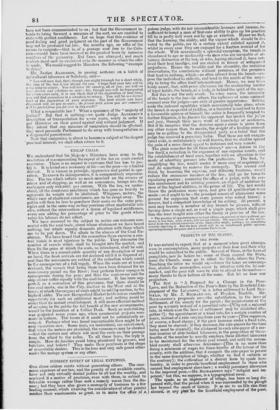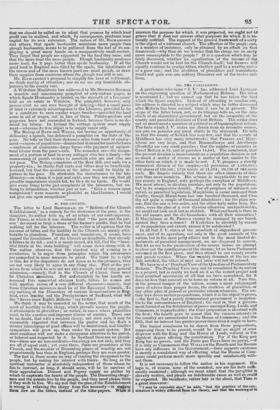. PROJECTS OF THE SEASON.
I. THE POOR.
IT was natural to expect, that at a moment when great .changes were in contemplation, many projects of their how and their Ow would he submitted to the public. Several of these, in the form of pamphlets, now lie before us : some of them respect the State, some the Church, some go to affect the Rich, others the Poor. Touching the latter we would say—lower the taxes on consump- tion, abolish the monopolies, cease to interfere with the labour- market, and the poor will soon be able to attend to themselves— many thanks to their betters all the same. But let us hear our projectors. The first is " A Proposal for a Change in the Poor- Laws, and the Reduction of the Poor's-Rate by the Beneficial Em- ployment of the Labourers," in. -a letter addressed to Lord Sur- FIELD, by Mr. J. Rionaansoer, of Heydon, Norfolk. Mr. RICHARDSON'S proposals are—the substitution, in the laws of settlement, of the county for the parish ; the maintenance 01' the poor by a county instead of a parochial rate—[Why not a national rate, in which case the laws of settlement may be abolished alto- gether ?]; the appointment of a fixed rate, for a certain number. of years, instead of a rate varying from year to year—[This supposes, of course, a fixed charge ; if the poor increase under a fixed rate, they must be starved ; if they decrease, the rate-payers for the time being must be cheated] ; the allotment.to each rate-payer of a cer- tain number of able-bodied labourers, in the proportion of three- fourths of the number he usually employs, these allotted labourers to be maintained for the whole year round, and until the assem- bled county shall otherwise determine—[This is no more than fixing a minimum of wages for three-fourths of the labour of the county, with the addition. that it compels the rate-payer to persist in the same deschiption of tillage, whether he find it suitable or the contrary] ' - the cultivation of a district farm by spade hus- bandry, in order to provide beneficial employment to those who cannot find employment elSew here ; a weekly pecuniary allowance to the impotent poor,-7-Mr. RICHARDSON says indigent and im-
potent," but this,-we suppose, is.a.typographical error.. .
• The spade, as an implement of• tillage, has been so long dis, pensed with, that the period when it was superseded by the plough lies beyond the reach of history-. It se ms to us litle else,than I absurd,. in any phytibr the beneficialemployment of the poor, that we should be called-on to adopt that process by which least profit ean be realized,. and which, by consequence, produces least capital for its own extension. The notion of Mr. RICHARDSON and others, that spade .husbandry maintains more people than plough husbandry, seems to be gathered from the fact of its em- ploying a great many hands 'on a comparatively small surface. They forget that people are supported by the food they raise, and that the more food-the more people. Plough husbandry produces snore food, for. it pays better than spade husbandry. If all the good land in England were tilled by the spade, the inhabitants of the towns and of the more barren portions must perish, or draw their supplies from countries where the plough was still in use.
Mr. RICHARDSON.S proposal to simplify the laws of settlement, we think worthy of attention; nor do we see any formidable ob- jections to his county rate. A Wiltshire Magistrate has addressed to Mr. STURGES BOURNE a sensible and unassuming pamphlet of only sixteen pages, in which Spade Husbandry is lauded, on the strength of a ten-years' trial on an estate in Wiltshire. The pamphlet, however, only proves what no one ever thought of denying—that a small piece of land is extremely advantageous to the labourer, provided he be in a condition to earn regular wages besides—provided the land come in aid of wages, not in lieu of them. Potato-gardens and piggeries have not succeeded in Ireland, because there is no de- mand fbr labour. In Ireland the cottage system must supply (neat—whereas its true object is to supply sauce only. The Bishop of BATH and WELLS, not having an opportunity of delivering a speech, has delivered a pamphlet on the state of the poor. He tells us that their distresses arise from want of employ- ment—excess of population—diminished demand for manufactures —enclosure of commons—large farms—the payment of agricul- tural labour from the poor's-rate. The remedies are—the assign- ment of a portion of land to every cottager who has a'family—the summoning of parish vestries to ascertain who are and who are not poor. The Bishop complains of the Beer Bill, and calls lhr a property-tax ; he thinks that rents and tithes may be beneficially lowered, but that the abolition of the latter would be highly in- jurious to the poor. He attributes the disturbances to the late Ministry—on whom it is just and right, now they are out, that all possible imputations should fall, for they do no harm. He would give every thing to the just complaints of the labourers, but no- thing to intimidation, whether just or not. "Give a reason upon compulsion ! were reasons as plentiful as blackberries, I would not give one upon compulsion."



























 Previous page
Previous page